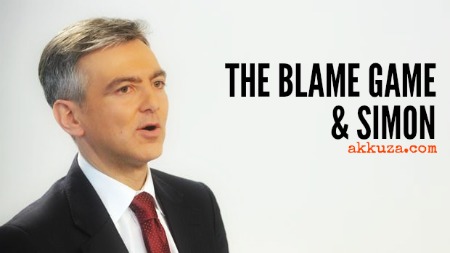
Joe Bloggs returns to J’accuse. The series in which he examines the Government’s spin is on hold. This time he kicks off a parallel series where he takes a look at the main controversial themes tackled by Daphne Caruana Galizia on the Running Commentary in recent years.
It’s been 7 hours and 15 days since they took your pen away… since you’ve been gone they can do whatever they want, they can see whomever they choose, they can eat their dinner in a fancy restaurant…
While part 1 of the Serial examining the Government’s Spin (and by now obvious efforts to shove it all under the rug) in the aftermath of Daphne Caruana Galizia’s assassination last Monday simmers away in your minds (plus I’m gathering information), I thought it worthwhile to write this parallel series of posts: The Daphne Files: An essential guide to the now frozen in time Running Commentary and the wealth of stories that it contains.
“There are crooks everywhere you look now. The situation is desperate.”
These final exasperated words in a post uploaded just mere minutes before she drove off into the sky provide a glimpse into the world that Daphne saw. A world that she illustrated to us and tried, at times with increasingly evident frustration, to shake us into understanding time and time again.
This final post was in relation to the utterly bizarre situation of the Chief of Staff (Keith Schembri), the left hand man of the Prime Minister of Malta (Joseph Muscat) and effectively the power behind the “throne”, not only refusing to resign or be removed but brazenly suing the ex-leader of the opposition Simon Busuttil for libel for daring to call him corrupt. This is a man who is named in the Panama Papers as having set up a Panamanian company sheltered by a New Zealand trust days after having been appointed as Chief of Staff, who engaged in a series of dealings with the ex-CEO of a newspaper (Adrian Hillman) that led to it teetering on the edge of bankruptcy and that directly or indirectly is the subject of 5 concurrent magisterial inquiries including about graft.
We have not heard anything about the results or progress of these inquiries (and likely will not) but hey at least the libel law suit is proceeding! Enough to make a less doped population’s blood boil, but the Labour government’s propaganda machine would have us believe that it is (pick one or more): (a) negative, (b) a fabrication, no “proof”, (c) all a Nationalist plot, (d) unpatriotic to think or speak badly about Malta (i.e. we will “deal with it” quietly) or (e) (my all time favourite, by an adjudicator no less) “kickbacks are not illegal”.
So, how did we get to this pathetic point? Welcome to the world of the Running Commentary. It really is a pity that the darn thing cannot be viewed in reverse order and is so primitive in navigation since it truly documents the dramatic changes that Malta has undergone since 2008 when it was set up.
From a catholic and perhaps innocent Malta (with rumours or undertones of shady operators operating on the fringes) that had just about adopted the Euro, to a Malta in 2017 where everything goes. A Malta that over the years has become numb and normalised the abnormal. A Malta where a series of civil society protests out of frustration over the broad daylight execution of a journalist and the ineffectual police commissioner and attorney general get twisted into “it’s a PN thing” and “the police are offended”. A Malta that (prompted by politicians in the shadows) organises an impromptu mass meeting in Rabat to show support to the Prime Minister, AG and police commissioner (if it’s an apolitical issue why organise a pathetic public show of support?) and another (it seems) in the offing on 10 November. A Malta that has lost control of its government and that, in times of utter distress, fear and frustration, looks to the current Opposition for solace and support and now sees that it is led by someone that at best carries a check-in baggage as opposed to a commercial cargo.
Worse, the government, who (likely sniggering) during the leadership election held off from attacking him (Adrian Delia), has now unleashed a barrage even attempting to point public suspicion towards the current leader of the Opposition by frantically drawing links to Libyan oil smugglers (who started the wild goose chase rumour that it was Semtex?) and, as a result, his circle of supporters and friends.
But I digress. Let’s leave this frustrating story and how we got here for another day.
What were the main stories and themes that the Running Commentary returned to time and time again? The Times and Lovin Malta each carried a quick article about these stories but it’s worth subdividing these thematically:
- The Loose Money – Henley & Partners and the acronyms (IIP – Golden Passport Programme & MRVP – VISA programme on steroids)
- Muscat’s meddling with the big boys including the Energy Masterplan – The Silk Road Economic Belt and Azerbaijan’s power play
- Sheiks and Hidden Hands – Vitals, AuM (Zonqor) and now Shoreline
- John Dalli (Snus and Lady Bird’s pensioners’ money)
- Everyone’s finger in the pie, the bribery of a nation
- The rise of Adrian DeLiar
Let’s look at each in turn:
The Loose Money – Henley & Partners and the acronyms (IIP – Golden Passport Programme & MRVP – VISA programme on steroids)
A scheme fiercely guarded under unforeseen levels of centralised control and secrecy (the core concession contract to Henley and Partners is so redacted that it looks like a cartoon prisoner’s outfit, to this day the names of new citizens are kept hidden and at this point is immune from freedom of information requests on grounds of national security lest it create a diplomatic incident), Daphne instinctively knew a good story when she saw one.
So what do we know about the IIP scheme (and its child, the MRVP which got a steroid boost after the 2017 election) so far?
There should be little doubt in anyone’s mind that this scheme, which was sprung up on an unsuspecting nation back in 2013 (it wasn’t in the 2013 electoral manifesto), was something that had been planned for a while.
Designed by Henley & Partners (who then went on to win what seems to be a pre-ordained tender), the IIP scheme hit a sweet spot with on the one hand the Maltese fixer mentality (initial objections appear to have been based on Henley getting the bulk of the booty rather than sustainability and reputation) and on the other the government’s thirst for a quick buck to be able to hand out sweets to the electorate.
A far cry from Minister Edward Scicluna’s bumbling statement in the EP’s budgetary committee meeting in December 2013 that this scheme “had nothing to do with the deficit or with financing”, “we put in a token of Eur 15m and the Commission is saying this should be down to Eur 8m” and is “just a token we can do without it…”, we are only just discovering the extent of our country’s increasing dependence on the sale of passports.
In the space of 4 ever so long years, the IIP scheme has (net of undisclosed Henley fees as well as kickbacks) so far purportedly brought Eur 309m into the mysterious “National Development and Social Fund” (which is included in the general government budget, and which figure does not include income / liquidity from mandatory bond purchases and add-on fees), is the sole reason for the #surplusgeneration hashtags you’re seeing on twitter and the budget ads still boasting about surpluses and is touted as the source of funding for Muscat’s 7 year road (re-laying) map.
Even Moody’s picked up on this and in its revised Credit Opinion of 9 May, 2017 (which was widely shared during the election as a feather in Labour’s cap without mentioning this part) noted that: “The result was mainly driven by stronger than expected revenues from both companies and households, notably due to more buoyant economic conditions and stronger than expected proceeds from Malta’s golden passport scheme, the Individual Investor Programme”.
No wonder Muscat accepted Henley’s advice to extend the cap agreed with the EU Commission indefinitely!
Besides the murky financial arrangements, the Running Commentary also drew a number of stark parallels between Malta and another Henley-owned country, St. Kitts & Nevis both as regards rents and as regards electoral campaigns.
In the next part we’ll take a look at Daphne’s (justified in my view) suspicion that, erm, perhaps all was not right with the ever increasing frequency of Malta-related news items on this Azeri website: http://en.apa.az/search?keyword=Malta&t=xeber .


